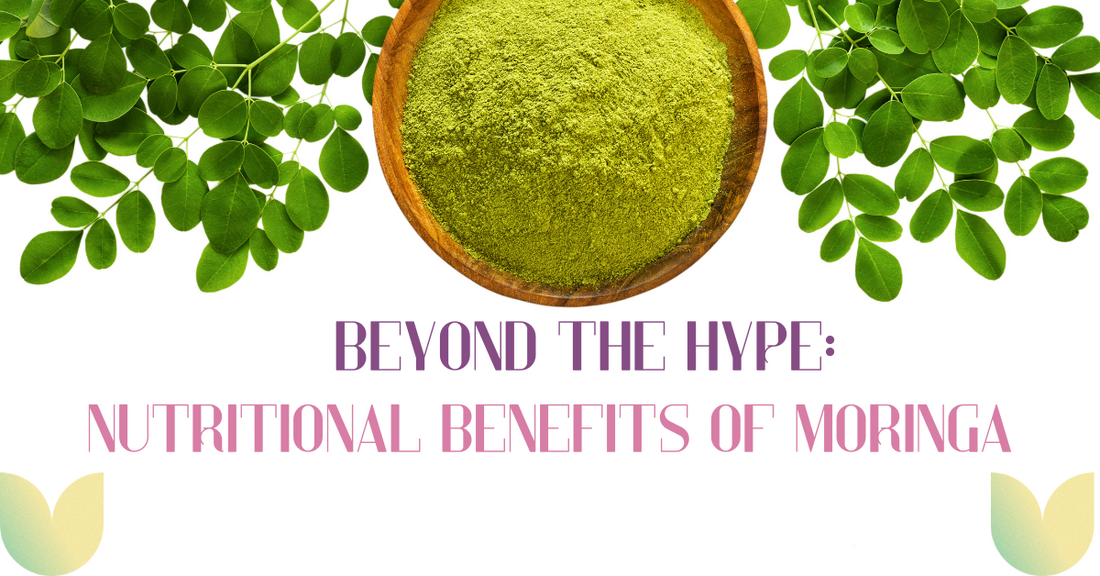
Beyond The Hype: Nutritional Benefits of Moringa
Share
Dubbed the "miracle tree," moringa is a powerhouse of nutrients celebrated for centuries in traditional medicine. Its leaves, seeds, and pods are filled with essential vitamins, minerals, and antioxidants, making it a must-have for anyone who tries to improve their overall health. Packed with vitamin C, calcium, iron, and protein, moringa is a natural boost to energy levels, helps strengthen immunity, and promotes healthy bones and muscles. Its versatility and ease of incorporation into meals have propelled moringa into the spotlight as a superfood for modern lifestyles.
Moringa's nutritional benefits go beyond just general well-being. It is a natural cure for targeted health concerns, including promoting heart health, reducing inflammation, aiding digestion, and enhancing the skin's glow. It's truly a gift of nature, be it in smoothies, soups, or supplements. Moringa invites you to discover its transformative potential. Are you ready to explore the magic? Read on!
Table of Contents
- Moringa as a Superfood: A Complete Nutritional Profile
- Vitamins and Minerals in Moringa Leaves
- Moringa Protein Content: A Plant-Based Powerhouse
- Antioxidants in Moringa and Their Health Benefits
- Moringa’s Role in Iron and Calcium Absorption
- How Moringa Supports Energy and Vitality
- The Omega-3 and Omega-6 Benefits of Moringa
Moringa as a Superfood: A Complete Nutritional Profile
Moringa has earned its title as a superfood due to its incredible nutritional density and health-promoting properties. Known for its ability to nourish the body holistically, it is packed with essential vitamins, minerals, and antioxidants. The nutritional benefits of moringa make it an ideal addition to a balanced diet, supporting everything from energy levels to immune health.
Here's a quick look at its complete nutritional profile:
- Rich in Vitamins: High in vitamins C, A, and E for immunity, vision, and skin health.
- Packed with Minerals: Contains calcium, potassium, and magnesium for strong bones and muscle function.
- High Protein Content: Offers plant-based protein, essential for muscle repair and growth.
- Loaded with Antioxidants: Fights free radicals, reducing inflammation and oxidative stress.
- Fiber-Rich: Supports healthy digestion and promotes gut health.
Moringa is truly a natural powerhouse for your health.
Vitamins and Minerals in Moringa Leaves

Moringa leaves are a treasure trove of essential vitamins and minerals, making them a cornerstone of the plant's incredible health benefits. The nutritional benefits of moringa leaves come from their dense concentration of nutrients that support overall wellness.
Key vitamins and minerals in moringa leaves:
- Vitamin C: Boosts immunity and skin health.
- Vitamin A: Enhances vision and promotes cell growth.
- Vitamin E: Acts as an antioxidant for healthy skin and hair.
- Calcium: Strengthens bones and teeth.
- Iron: Enhances blood health and prevents fatigue.
- Potassium: Maintains heart health and muscle function.
Moringa leaves are nature's multivitamin.
Moringa Protein Content: A Plant-Based Powerhouse
Moringa is an exceptionally plant-based source of proteins; hence, it benefits vegetarians, vegans, and anyone in the world who needs to upgrade their protein level naturally. Moringa protein is rich in high-quality protein containing nine amino acids critical in building and repairing tissues. Therefore, a plant-based protein source such as moringa. Moringa protein benefits:
- Builds and maintains muscle: this helps to increase body muscles.
- Heals tissue damage: helps in wound healing.
- Boosts energy levels: a source of permanent energy.
- Helps you control weight: keep one fuller for a longer period
- Easily digestible: appropriate for all age brackets.
- Moringa: a protein powerhouse toward healthiness.
Antioxidants in Moringa and Their Health Benefits
Moringa is rich in potent antioxidants that guard your body against damaging free radicals, thereby decreasing the possibility of chronic diseases. Some of the nutrients present in moringa are quercetin, chlorogenic acid, and beta-carotene, among others, which collectively help fight oxidative stress and inflammation. The antioxidants will protect your health and promote radiant skin and a robust immune system.
Some of the major health benefits of moringa antioxidants include
- Fights Inflammation: Helps reduce swelling and pain.
- Boosts Immunity: Strengthens the body's natural defence.
- Supports Heart Health: Protects blood vessels and lowers cholesterol.
- Promotes Skin Health: Keeps skin youthful and radiant.
- Protects Brain Function: Improves memory and mental clarity.
Moringa's antioxidants are nature's secret to vitality.
Moringa’s Role in Iron and Calcium Absorption
Moringa enhances the absorption of iron and calcium, making it a real nutritional powerhouse. The most significant nutritional benefits of moringa are its high concentration of iron and calcium, which contribute to healthy blood and healthy bones. What is even more impressive about moringa is its vitamin C content, which increases the absorption of iron and magnesium, enhancing the uptake of calcium, thus making it an ideal natural remedy for anaemia and bone-related issues.
Key benefits of moringa for the absorption of iron and calcium:
- Fights Anemia: Increases iron levels and decreases fatigue.
- Makes Bones Sturdy: Improves calcium assimilation to build stronger bones.
- Supports Muscle Activity: Supplies indispensable minerals to keep muscles at their best.
- Increases Energy Levels: Aids oxygen transport due to iron content.
- Increases General Well-Being: Brings various nutrients together for a harmonious healthy body.
Moringa is a non-medical way to reinforce your body.
How Moringa Supports Energy and Vitality

Moringa is a natural energy booster. This plant revives the body and mind. Moringa nutrition comes from a rich combination of vitamins, minerals, and antioxidants. It fights against tiredness and supports sustained energy levels. It contains essential nutrients, such as iron, magnesium, and vitamin C, which fight off tiredness and provide more general vitality.
Key ways that moringa supports energy and vitality:
- Boosts Stamina: Packed with iron and protein for endurance.
- Reduces Fatigue: Fight tiredness with magnesium and vitamin C.
- Boosts Mental Clarity: Supplies nutrients for enhanced concentration and alertness.
- Supports Hormonal Balancing: Naturally energizes energy.
- Digestion: Helps in the absorption of nutrients to maintain constant energy.
Moringa makes you feel energized and ready for anything.
The Omega-3 and Omega-6 Benefits of Moringa
Moringa is a natural source of omega-3 and omega-6 fatty acids, which are essential for health. Healthy fats in these contribute to the nutritional benefits of moringa, ensuring heart health and brain functions, and reducing inflammation. Omega-3s help the mind become clear, and omega-6s are good for healthy skin and hair. They complement each other to bring about perfect harmony for your body's well-being.
Key benefits of omega-3 and omega-6 in moringa:
- Supports Heart Health: It reduces bad cholesterol and enhances circulation.
- Improves Brain Function: Enhances focus and memory.
- Reduces Inflammation: Helps in managing joint and muscle pain.
- Improves Skin Health: Keeps the skin hydrated and glowing.
- Boosts Immunity: Strengthens the body's defence system.
Moringa's healthy fats make it a true superfood.
Frequently Asked Questions
Is Moringa High in Protein Compared to Other Plants?
Researchers are particularly interested in Moringa oleifera leaves because of their high protein content and plenty of minerals. Moringa oleifera leaf protein is a sustainable and promising source of protein that outperforms other traditional plant proteins in terms of nutritional value and biological potency.
How Does Moringa Improve Iron Deficiency?
Additionally, moringa leaves are rich in carotenoids and ascorbic acid (AA), which are known to improve iron absorption (220 and 80 mg/100 g fresh weight (FW), respectively).
Can Moringa Replace Vitamin Supplements?
It is crucial to keep in mind, nevertheless, that a 10g portion of moringa powder does not provide our bodies with all the nutrients they require, including vitamin B12 and vitamin C at the source level. It must have more than 15% of your daily requirement (NRV per serving) for a vitamin or mineral to qualify as a source.
Does Moringa Contain Essential Fatty Acids?
Sterols, tocopherols, proteins high in sulfated amino acids, and monounsaturated fatty acids with a high monounsaturated/saturated fatty acid (MUFA/SFA) ratio make Moringa oleifera seeds a viable resource for both food and non-food applications.
What Are the Best Ways to Consume Moringa for Nutrition?
It is really simple to use moringa; simply add 1-2 teaspoons (or half a teaspoon if you are just beginning) to any food or beverage that might benefit from a few spinachy greens. Simply use it like you would any other green herb or seasoning. This is the simplest way to think of it as superfood seasoning.
